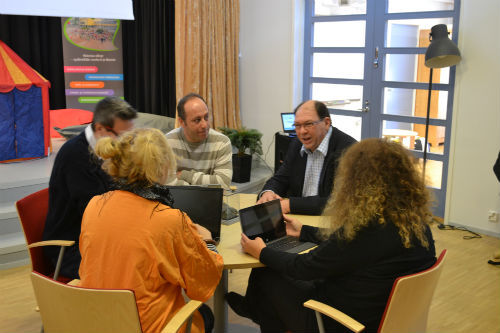
“I want everyone in a school to experience a sense of joy, and to learn.”— Mikko Salonen
All schools in Finland are primarily public schools, with cities and municipalities as the proprietors. The reasons for a proprietor to seek school improvement, according to Mikko Salonen, “can include factors such as poor learning outcomes, poor feedback from parents, decreased attractiveness, leadership problems, conflicts among personnel, or possibly even decreased well-being among pupils or staff.”
Salonen has extensive experience in the pedagogical field as a teacher, a principal and a leading expert in school improvement. He is a member of ENIRDELM and collaborates with advisors to the Premier and Minister of Education of Ontario, Dr. Michael Fullan and Dr. Andy Hargreaves (Winners, Grawemeyer Award in Education, 2015).
His work includes developing leadership programs for individual schools, both as a trainer and as a consultant. He describes his expertise as being able to tackle three types of problems: successful schools wanting an outside sparring partner or coach to promote internal collaboration strategies; schools wishing to further develop specific sectors of their activities; and finally, schools that have more significant problems. He joins us today in The Global Search for Education to share what he has learned about improving schools.
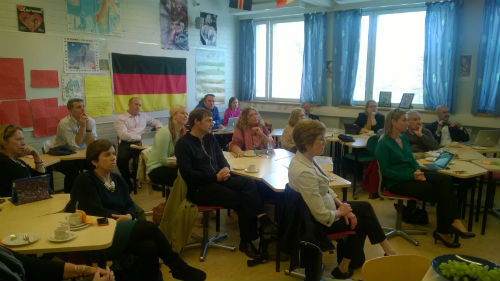
Mikko, how would you describe your goals?
My mission is that teaching and education at a school should develop. I want to promote this as a school developer, a trainer, and a consultant on school leadership. I believe my mission will significantly boost the development of society.
It is important to me for children and young people to learn while they are at school, and to see it as a worthwhile experience. It is also important to me for professionals, teachers and other school personnel to know their professions and develop their professional skills together. I want everyone in a school to experience a sense of joy and to learn.
Setting goals in my work always starts with wanting to operate in an ethical manner to promote sustainable change at school. In some situations, the school itself has not understood the need for outside help with their problems. In these kinds of cases, the initiative will often come from the school’s proprietor.
What are the basic elements of your roadmap in order to achieve your goals?
The school itself, and specifically its personnel, are the agents of change – not me! In this sense, my approach is very much the same for schools that are having problems and those simply wanting to develop their activities. I am there to help and guide them in their professional process of change.
At the beginning of a process of change, I usually work with a school’s administration. We define the current state of the school, setting the goals for the development and assistance process. At this point, the school’s proprietor may also be involved. We go through what my role is in the process and how much money and time is available.
In the next phase, the launching of the activities, the players – the entire community – is approached and the process is made visible. For the school’s leaders and the whole working community, an intentional interruption is needed. The need for development must be internalized, all the way down to the level of the individual, with each individual responsible for change. In the starting phase of this process, the aim is the setting and understanding of the main goals, and naturally, visualizing how the main goals can be achieved together.
After the launch of a school’s actual development process, the different problems are defined as individual development questions that promote the main goals of the work through deliberation and collaboration. Learning by doing is the way to build an answer to why the process was embarked upon. In this way, the initial problem disappears through goal-oriented and systematic action, and at the same time, the school’s capacity to face similar future challenges grows.
In consulting on the development of schools and in guiding development, the question ultimately involves the directing of learning of individuals in the community, and the entire community. Often when a new culture is built, it is also necessary to unlearn old practices that do not work. Learning by individuals and the community is a method of change for development work.
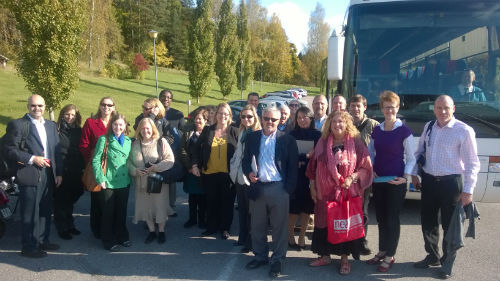
Which strategies do you think have been the most effective when improving poor performing schools in Finland and why?
The goals of working with poorly-performing schools and their leaders need to be specified carefully with the leadership and personnel. A written survey on the activity of the school helps to define goals. These often describe what the problem is, but their weakness is that they do not bring solution models with them.
In difficult situations, I often conduct individual interviews with personnel and administrators. In such interviews, a consultant is able to talk to individual people in confidence about perceived problems as well as their proposals for a solution. In the interviews it is also good to raise the question of how the person in question is willing to act or to help the community in solving the problem.
The outcome of the interviews is summarized and presented to the leaders and personnel. The process helps the community and its leaders to set goals for the development project.
We need to keep in mind that nobody wants to work in a poorly functioning school, or to lead such a school. People often even feel shame at the prevailing situation. For this reason it is important for a consultant to promote confidence in a better future for the school and to strengthen the feeling that the school is not alone, or that it’s not being left alone with its problems.
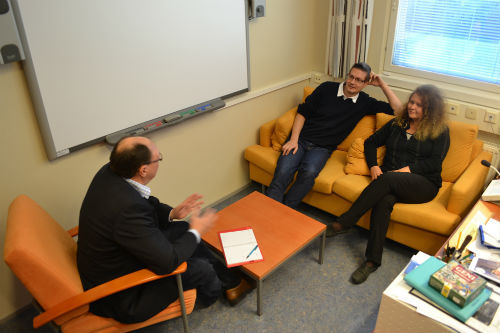
What mistakes have you seen made? What did you learn from them?
Change in schools is a very complex event with many factors having a simultaneous influence, while some are beyond our capacity to influence. It is important to recognize and to have a healing influence on what we can affect. It is also important to learn to live with what we cannot influence.
In guiding change, a consultant must be successful in creating a realistic sequence of events – a process that leads to a desired change in the school’s activities. For this to succeed, it is important to build a systematic structure for the school’s process of change, and the sequence of events needs to be consistently guided in this structure. However, a school or a school’s leaders cannot always follow the plan in the structure systematically enough. In such situations, consultants themselves might have to take on greater responsibility than usual, even to maintain the process temporarily.
Many development processes in schools have failed because of a lack of time. Processes of change, originally intended as learning processes for people, have turned into projects, with a report as the only final result – not a change in how people act.
An unwieldy process of change can lead to failure. Resources needed for development are depleted, or the basic task of a school starts to suffer. When this happens teachers, as conscientious people, choose between development work and working with their pupils.
It is also important to know how to correctly steer resources into development. Sufficient collective concentration is needed on what really needs to be done. For this purpose it helps, occasionally, to systematically pause and evaluate the quality and results of what has been done.
In the development of a school it helps to have an ability to interpret information from evaluations and questionnaires. It can often happen that the information is simply not believed, or it is rejected and pushed aside.
Many consultants have the tendency to be all-knowing and all-powerful. The consultation process might become derailed if the consultant takes too powerful a role or focuses the work wrongly.
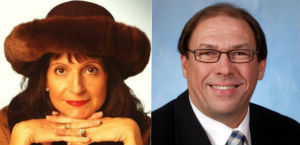
(All photos are courtesy of Konsulttipaja Oy)
Join me and globally renowned thought leaders including Sir Michael Barber (UK), Dr. Michael Block (U.S.), Dr. Leon Botstein (U.S.), Professor Clay Christensen (U.S.), Dr. Linda Darling-Hammond (U.S.), Dr. MadhavChavan (India), Professor Michael Fullan (Canada), Professor Howard Gardner (U.S.), Professor Andy Hargreaves (U.S.), Professor Yvonne Hellman (The Netherlands), Professor Kristin Helstad (Norway), Jean Hendrickson (U.S.), Professor Rose Hipkins (New Zealand), Professor Cornelia Hoogland (Canada), Honourable Jeff Johnson (Canada), Mme. Chantal Kaufmann (Belgium), Dr. EijaKauppinen (Finland), State Secretary TapioKosunen (Finland), Professor Dominique Lafontaine (Belgium), Professor Hugh Lauder (UK), Professor Ben Levin (Canada), Lord Ken Macdonald (UK), Professor Barry McGaw (Australia), Shiv Nadar (India), Professor R. Natarajan (India), Dr. Pak Tee Ng (Singapore), Dr. Denise Pope (US), Sridhar Rajagopalan (India), Dr. Diane Ravitch (U.S.), Richard Wilson Riley (U.S.), Sir Ken Robinson (UK), Professor PasiSahlberg (Finland), Professor Manabu Sato (Japan), Andreas Schleicher (PISA, OECD), Dr. Anthony Seldon (UK), Dr. David Shaffer (U.S.), Dr. Kirsten Sivesind (Norway), Chancellor Stephen Spahn (U.S.), Yves Theze (LyceeFrancais U.S.), Professor Charles Ungerleider (Canada), Professor Tony Wagner (U.S.), Sir David Watson (UK), Professor Dylan Wiliam (UK), Dr. Mark Wormald (UK), Professor Theo Wubbels (The Netherlands), Professor Michael Young (UK), and Professor Minxuan Zhang (China) as they explore the big picture education questions that all nations face today.
The Global Search for Education Community Page
C. M. Rubin is the author of two widely read online series for which she received a 2011 Upton Sinclair award, “The Global Search for Education” and “How Will We Read?” She is also the author of three bestselling books, including The Real Alice in Wonderland, is the publisher of CMRubinWorld, and is a Disruptor Foundation Fellow.
Follow C. M. Rubin on Twitter: www.twitter.com/@cmrubinworld


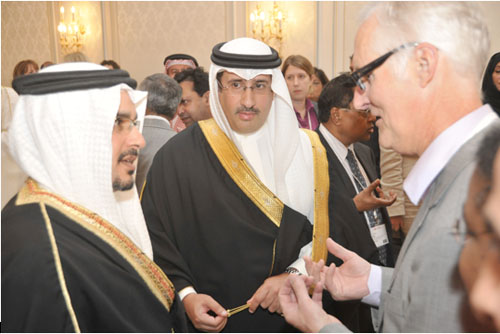

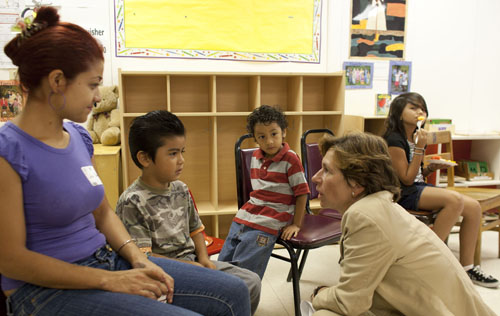
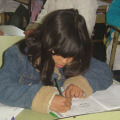
Recent Comments